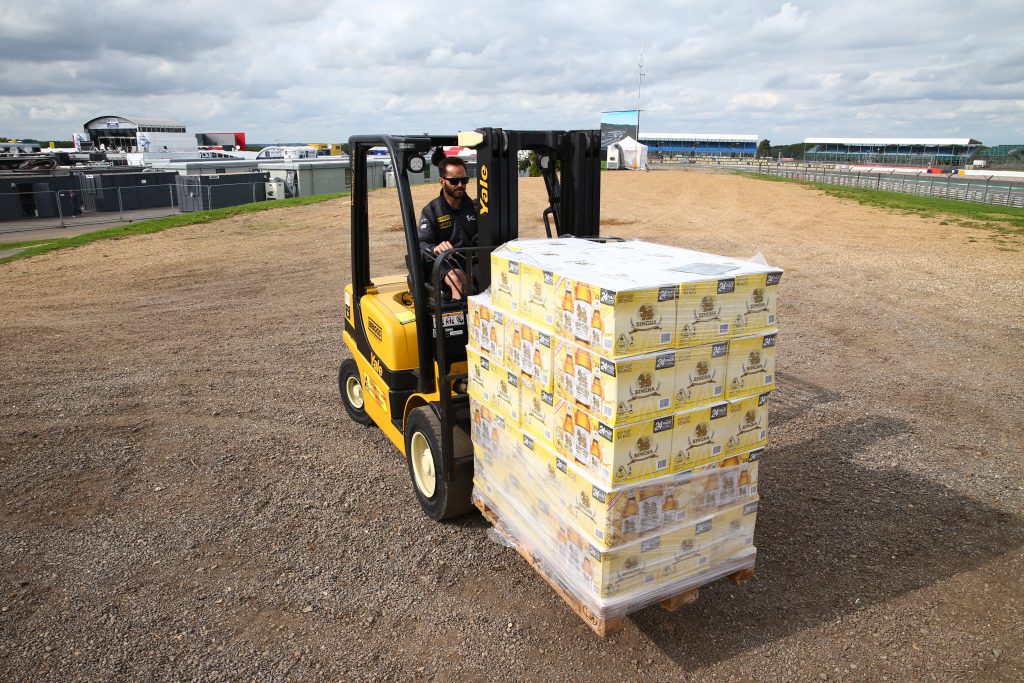Case Study: Up to Speed in the MotoGP Paddock
18th December 2017

If anyone understands the importance of timely logistical operations within the MotoGP™ paddock then that person is Robert Berenguer, Logistics Director, Operations Department at Dorna Sports, the company responsible for the organisation of the global motorcycle championship. “I’ve been working for MotoGP™ for ten years now, and I’ve always been involved in logistics since the start of my career,” explains Robert. “In a race week our job usually starts before everyone else’s has begun and finishes when everyone else’s is done. During the week of the event we have contents in around 11 to 15 lorries. It takes us 12 to 24 hours to unload, and then the same again to load the lorries ready for the next event.”
Robert continues: “Trust and reliability are important. Knowing that the lorries and forklifts will be there when required is essential.” This is where the work of Yale Europe Materials Handling is of vital importance. As the designated Forklift Supplier to MotoGP™, the FIM MotoGP World Championship, Yale has provided a variety of lift trucks with lifting capacities from 2.5 tonnes to 8 tonnes at each of the final six European events of the 2017 season.
Yale has become an integral part of the MotoGP™ logistics operation, and is heavily involved in the infrastructure that feeds the events, from the loading/unloading of the Dorna lorries to the set-up of the VIP Village hospitality. “Each circuit has different logistical demands. The Yale lift trucks have successfully met the challenges of the circuits and aided in the smooth running of each MotoGP™ event, particularly in the hospitality areas,” says Robert.
Catering to specific needs
Yale helps Dorna tackle the varying logistical needs of every venue by working in conjunction with local Yale dealers to provide the Championship with the required trucks. One of the central logistical operations within the paddock is the set-up of the VIP Village, the main hospitality area where guests can enjoy gourmet cuisine, exclusive entertainment and unrivalled views of the track. “Depending on the venue, visitors to the VIP Village can range from 400 to 3,000 over the course of the weekend,” comments Robert.
Construction of the paddock and the VIP Village must be seamless and efficient to allow the different departments, including the food and beverage teams, to begin their own setup in a timely manner. As paddock space varies from event to event, versatility is key to operational success.
Some venues are notoriously tight and difficult to manoeuvre, whereas at others, the paddock is located outside of the circuit. For example, Valencia, as the final event on the Championship calendar, hosts the largest number of guests in the VIP Village. However, the paddock space is one of the tightest in MotoGP™, and Dorna requires an adaptable solution.
The Italian Job
The fourth event in the Yale-MotoGP™ partnership was the San Marino round, taking place at the Misano circuit. To handle the demands of the Italian round of the MotoGP™ Championship, Dorna was supplied with forklift trucks from the premium Yale® Veracitor® counterbalance truck range, including 2, 2.5 and 7 tonne capacity versions.
The material requirements of the hospitality units used within the VIP Village were transported in two 15-metre trailers, each containing 30 pallets that varied from 500kg to 2,000kg in weight. In them were washing and cleaning machinery, as well as the most important and heaviest load, the ovens, which weigh almost two tonnes.
A third semitrailer arrived later in the week, containing all the food and beverage to be consumed in the hospitality and catering areas. The load consisted of pallets carrying fruit and other consumables, as well as a large amount of thermo boxes that came with trolleys.
With 2,500 guests visiting the VIP Village across the race weekend and consuming 10,000 litres of beverages (including 1,600 litres of Singha Beer alone) and 7.5 tonnes of food, transportation of catering goods was a vital part of the race week.
Precision and rigidity in the timing of the unloading of the goods into the catering areas of the VIP Village was of utmost importance. Yale lift trucks were in operation throughout the day on the Monday of the race week, on Friday and Saturday morning, and on Sunday in the early morning and late evening once the spectators had left.
Feeding the infrastructure
“Having a fully operational and versatile fleet of forklift trucks is crucial to ensuring that the logistics of each event runs smoothly. If the foundations aren’t there from our side, we could potentially cause issues for our colleagues in hospitality and catering who need to serve their customers efficiently,” Robert states.
Once the crowds have departed the circuit the hospitality unit is dismantled and loaded onto the trucks used by Dorna to transfer infrastructure between venues. Dorna also transports the catering unit for teams and staff members, as well as occasionally helping some Dorna partners with the goods for their hospitality units.
“As soon as the race day is over, the work of the logistics team begins again. Much like the unloading process, time is of the essence to ensure everything is packed up and ready to be transported to the next event,” comments Robert. “Yale plays an essential role throughout the process of building and dismantling the infrastructure. Without the trucks efficiently doing their jobs, we would have some very hungry, thirsty, and unhappy guests!”

